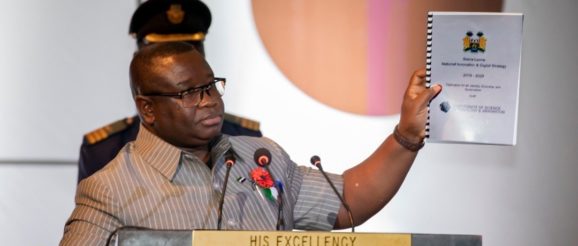Sierra Leone now has a National Innovation and Digitisation Strategy – will it eradicate poverty?

Sierra Leone Telegraph: 4 November 2019:
Sierra Leone is classed as one of the poorest nations on earth, and possibly also one of the most corrupt in Africa. This has to change, and president Bio it seems is in a hurry to do just that.
With hundreds of millions of dollars misappropriated every year across government, and tens of millions wasted, due to inefficiencies, low productivity, and lack of skills and expertise, the Bio-led government has now turned to the principles of innovation and digitalisation for answers.
Last Friday, in the plush surroundings of the Bintumani Hotel in the country’s capital Freetown, president Julius Maada Bio unveiled the country’s blueprint for transforming government through innovation and digital technology – the National Innovation and Digitalisation Strategy (NIDS).
Innovation and digitalisation do not come cheap, and the government is yet to reveal its budgetary implications amid growing calls for reduced public spending on ‘non-essentials’.
But the president said that the launch of the Innovation and Digitalisation Strategy is just the start of the nation’s long journey to digital transformation, as part of a series of government’s efforts in driving up innovation.
More importantly, he added that, it is critical to the kind of future he is trying to build, where technology and innovation will provide answers and solutions to the myriad of questions and problems that are holding back the country’s economic and social development.
Blaming the previous government for the country’s predicament, president Bio said: “The cost of governance had been deliberately bloated because of fraud, misuse and corruption. Effectiveness, efficiency and transparency in governance processes, revenue collection and public service delivery had been severely thwarted by the failure to imagine how we could do all those better. I had pondered for years over issues, such as how corruption has brought the country’s economy and governance to its knees.
“I have pondered on the use of data to understand dimensions of urban housing and poverty, water, sanitation and health, and also using the power of technology to provide improved access to justice, access to information and access to quality education that is fit for purpose. Using technology and innovation to provide quality education and introduce content in innovative ways, present new forms of pedagogy, while improving outcomes and achievement levels for our students,’’ he said.
 He said that there are many more questions, but the overarching question being – how to use technology and innovation to fast-track Sierra Leone along the pathway of development.
He said that there are many more questions, but the overarching question being – how to use technology and innovation to fast-track Sierra Leone along the pathway of development.
President Bio said that since the establishment of the Directorate of Science, Technology and Innovation (DSTI) by his government last year, they have made huge efforts in mainstreaming technology and innovation into the workings of government.
He added that the launch of the NIDS is indicative of how much the DSTI has proven to be very instrumental in moving his vision for a better Sierra Leone forward.
“We were excluded from the first and second industrial revolution by factors of history. In the third industrial revolution, we were consumers and mere spectators. The fourth industrial revolution is here, and I believe that by enhancing the capability and capacity of our people, through comprehensive human capital development, we can achieve real economic growth and real development as a nation.
“Today, we celebrate collectively as Sierra Leoneans, a vision for the future, and exhort one another to steadfastly pursue that vision for all our sakes. We have digitised governance processes, simplified business registration and revenue collection, and therefore reduced the cost of starting and doing business, providing public services, reducing the cost of and instituting more predictability and transparency into governance,’’ the president said.
President Bio also said that his government has linked citizens data with their unique national insurance numbers to increase efficiency and reduce fraud. Sierra Leone, he said, is the first African country to use Blockchain Technology to establish a National Digital Platform.
Sierra Leone’s Chief Innovation Officer, Dr David Moinina Sengeh (Photo), said that the launching of the country’s Innovation and Digitalisation Strategy is about the future of a Sierra Leone and its transformation through innovation – a future where, he said, children will be able to access quality learning materials through solutions developed by their peers; a future where a local farmer can have the real-time and quality information they need at their fingertips to increase the output of their farms; and a future, where a sick patient will know precisely which health facility to visit to obtain the best care.
“The National Innovation and Digitalisation Strategy is a living document. We know that technology changes so quickly that within a couple of years, many things will become redundant and the solutions we are designing for our challenges now, may not even work. That means, as a country, we each have a responsibility to continue to shape it, particularly in how we deploy resources and how we choose to solve our collective challenges,’’ he said.
